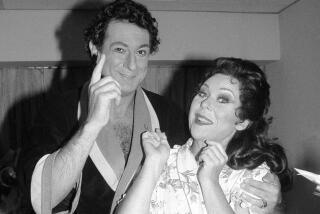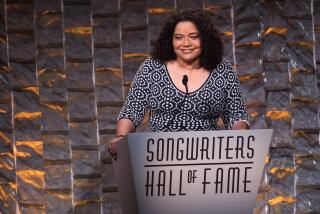Jan DeGaetani; Soprano in Avante-Garde Music
- Share via
Jan DeGaetani, a soprano who became a major presence in modern music through her recitals and recordings while never singing opera and eschewing most popular standards, has died in a Rochester, N.Y., hospital.
She was 56 when she died Friday and had been fighting leukemia.
With a 2 1/2-octave range, Miss DeGaetani became one of the most respected interpreters of avant-garde music in this age. She was noted for her scholarly approach and perfect technique in a repertoire that ranged from Renaissance music to 20th-Century Broadway composers. Critics didn’t believe her when she said she lacked perfect pitch.
She herself said she felt most at home in chamber music.
Musicologist Peter G. Davis called “her basic gift . . . something that only the greatest singers possess; she is completely in touch with her voice and her art--everything she does, every vocal and interpretive decision sounds absolutely right and inevitable.”
The Times’ Martin Bernheimer called her “a singer of remarkable intelligence and expressive power, with a voice clear and true throughout its wide range.”
The mezzo-soprano toured the world and sang with most major orchestras, interpreting the works of composers ranging from Bach to Beethoven to Ravel. In 1973, she gave the world premiere of Peter Maxwell’s Davies’ “A Stone Litany.”
A 1955 graduate of the Juilliard School (she had been admitted in 1951 when she still could not read music--”When the notes on the page went up, I went up, when they went down I went down,” she told a long-ago interviewer), she spent her first year out of school learning Arnold Schoenberg’s “Pierrot Lunaire.” That experience attracted her to avant-garde music, and later such modern composers as George Crumb, Jacob Druckman and Pierre Boulez composed for her.
Over the years she made nearly 40 recordings, taught at the Eastman School of Music in Rochester and the summer festival in Aspen, Colo.
In one of her rare retreats to traditional music, she was given Stereo Review’s Record of the Year for 1972 for “The Songs of Stephen Foster.”
Miss DeGaetani was born Jan Reutz, but took her professional name after her marriage to conductor Thomas DeGaetani. They divorced in 1966, and she married oboist Philip West, who participated in many of her recitals. Besides her husband, she is survived by two children from her first marriage, her mother and a sister.
More to Read
The biggest entertainment stories
Get our big stories about Hollywood, film, television, music, arts, culture and more right in your inbox as soon as they publish.
You may occasionally receive promotional content from the Los Angeles Times.









